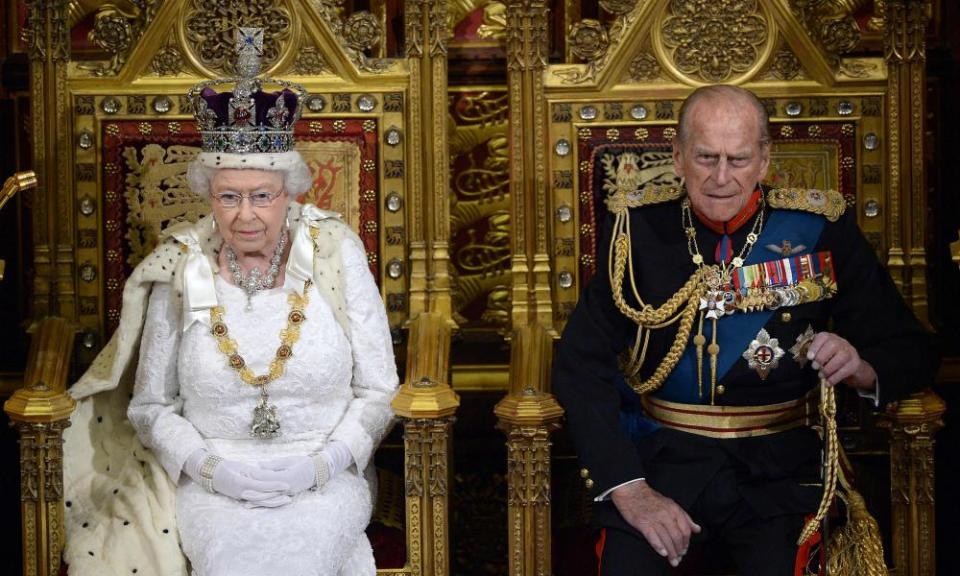This is a moment to mark the Elizabethan era, and ask what Britain has become

The Elizabethan age is slowly drawing to a close. The end of Prince Philip’s long life is a dress rehearsal for its final curtain, when the country will find itself reviewing what it has become, the choices it has made.
Celebrate her era’s social freedoms in gay rights, divorce and abortion, and at least an alertness to race and sex discrimination. But take note too of the decline in social mobility. The crown is emblematic of growing class rigidity: her subjects are more unequal and less likely to rise above their birth status than when the Queen ascended the throne.
Her longevity, through 14 passing prime ministers, lends a misleading veneer of continuity to a time of near-revolutionary turmoil. During her reign, the Tories have governed for around twice as many years as Labour. But they are now the Conservative party in name only. It was seized in two coups: once by Margaret Thatcher’s Hayekians in 1979; a second wave when the Brexit party took over.
The ageing Harold Macmillan saw his party was no longer recognisable when he denounced Thatcher’s great sweep of privatisations as selling off the family silver. Her Tory revolutionaries shrunk the Queen’s state in scope, capacity and taxation, with British companies recklessly sold abroad: even today, the business secretary, Kwasi Kwarteng, is watering down rules on foreign takeovers.
An army reduced to 76,500 might herald a new realism about Britain’s global standing, but our current prime minister still spouts world-class bombast. The Queen may live to see her realm disintegrate beneath her throne, with Scotland and perhaps Northern Ireland departing from the unpleasant little England that ignored their remain votes. The country is already fractious with the European Union and irrelevant to the United States, but the serious risk to UK influence will be the widespread disrespect for what we’ve become.
The Queen has seen Britain decline from wartime victory and the 1945 rise of the welfare state, to this prancing Ruritanian minnow, thanks to a succession of these radical wreckers. A rich ex-prime minister is caught lobbying for a failing financier, and stood to make tens of millions. Worse, his head of a civil service once proud of its bowler-hatted probity, lost all sense of public ethos by throwing open government procurement to this sharp operator.
Squalidly bewitched by hot finance, there goes the respectable old establishment. But Boris Johnson never pretended to honesty, rewarding donors with ermine despite official objections, gifting lucrative protective-equipment contracts to pals, wafting public money to his lover, diverting bungs from the towns fund to Tory seats, shutting down parliament, and brazenly breaking international law with his internal markets bill. Now he curbs the judiciary’s power to challenge his law-breaking. What feels so sinister is a new impunity: never mind 130,000 Covid deaths, it’s pub opening time.
We know nothing of the Windsors’ politics, but the miasma of monarchy sets a stamp of respectability on whatever rottenness hides beneath. Subtly, with its claque of a press, the crown helps make a Conservative vote seem the British patriotic norm. That mystical word “sovereignty” worked its magic in the Brexit referendum, as if it embodied the monarch herself.
There were choices every step of the way down this ruinous post-1979 path. There was a more Scandinavian option: imagine if we had put North Sea oil revenues into a sovereign fund like Norway did, to secure a strong state in perpetuity, investing in education. The authentically patriotic choice now is to invest, with inspiration from Joe Biden, in jobs and British talents. Instead of planned cuts, plough funds into our sciences, the arts, sport and invention.
Related: ‘Prince Philip’s death is the end of an era. What is the future for the royals?’
Of course the monarchy never stopped the country electing a progressive government. But the pomp of the crown acted as useful cover for the wild insurgents subverting the Tory party. This week is a reminder of how their culture war weaponises the monarchy. Despite overwhelming sympathy for the 94-year-old queen’s loss of her husband, their bulldogs hunt down imaginary slights among any who reject their narrow Brexity Britishness.
Fear-stricken broadcasters bowed to these bullies with a Soviet-style 24-hour shutdown of the major TV channels. Even then the Brexiteer-founded Defund the BBC went on the attack: “Disgraceful! The anti-British BBC has set up a form to encourage complaints about the volume of coverage of Prince Philip’s death.” The BBC, our best global influencer, needs to stiffen its spine against these barbarian enemies.
In the avalanche of Philip coverage, the culture warriors were disappointed by a dearth of disrespectful material. They tried absurd outrage at Keir Starmer sending his condolences 11 minutes early; at Jeremy Corbyn, not told of the royal news, tweeting about Bolivia instead. They claimed a non-existent “backlash” at Ursula von der Leyen slightly mistaking the prince’s title. No joy even from the anti-monarchy group Republic, which politely sent its condolences.
The country was not always so cowed. Unchecked, these bullies will terrorise all unorthodoxy as unpatriotic: by making poppy-wearing virtually compulsory, they perversely destroyed its emotional impact. By enforcing Rule, Britannia! at the Proms, they ruined its warm self-mockery. They claim “tolerance” as a British virtue, even as they browbeat resisters.
Thugs disguised as conservatives feel the Brexit vote gave a strutting ascendancy to their ersatz patriotism. Their “war on woke” tries to crush any acknowledgment of institutional racism and sexism as un-British. But it’s now for progressives to lay claim to authentic patriotism: a love of country that sees social injustice with its eyes wide open and aims for something better. There is just time to see off the rotten party that brought the country low, and end the Elizabethan era with some of the optimism with which it began.
• Polly Toynbee is a Guardian columnist

 Yahoo Finance
Yahoo Finance 